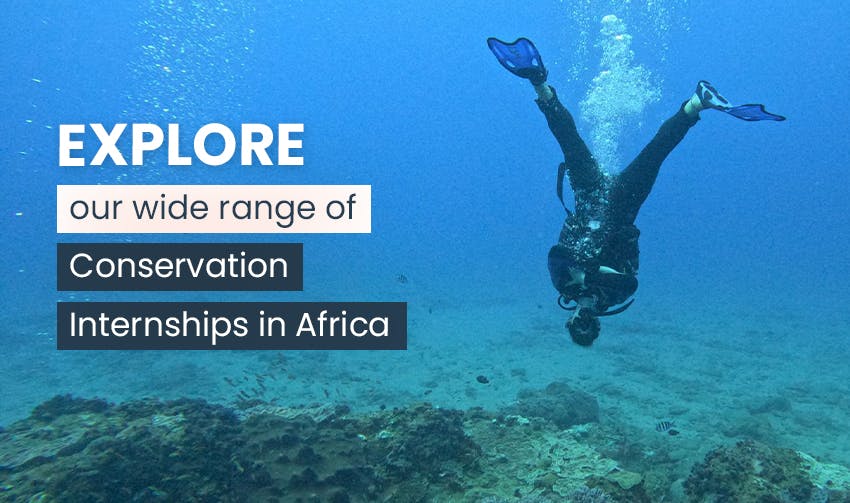
Intern Abroad HQ offers diverse Environmental Conservation Internships throughout South Africa. Discover the country’s natural beauty, excellent surfing, incredible ‘Big 5’ wildlife, and diversity of culture and ethnic groups. Pick from a special selection of Conservation internships in some of South Africa’s top national parks in the fields of Reserve Management & Research, GIS Specialization & Reserve Management and Marine Biology & Reef Conservation.
Interns can choose a minimum duration of 2 weeks (for Sodwana Bay) or 4 weeks (for Kruger National Park and Gondwana Game Reserve) and up to a maximum of 12 weeks, with start dates twice a month, Let us take care of connecting you with a network of host organizations within your field, while also arranging your airport pick up, accommodation, meals and providing 24/7 in-country support.
- How can I choose which Environmental Science internship location is right for me?
- What do these different internship locations all have in common?
- Why are internships and conservation important in these regions?
- What might a typical day/week look like for an intern?
- When is the best time of the year to go?
- What items should definitely be on an intern’s “pack list”?
- What are the most common misconceptions about these internships?
- What are the safety considerations for an internship in South Africa?
- How do interns access the South African Environmental Internships?
- What can I expect from the food and accommodation?
- Is anyone eligible to join an environmental internship in South Africa?
- Sign me up! How can I start planning my Environmental Internship?

1. How can I choose which internship location is right for me?
At a glance…
-
Do you scuba dive or want to learn? The internship at Sodwana Bay, which focuses on marine conservation, is probably the right match for you.
-
Want an adventure? If you’re looking for a quintessential African experience that’s a little “off the beaten path”, intern in the Gondwana Game Reserve or Kruger National Park.
The internship at Sodwana Bay is perfect for people who are passionate about diving, marine science and conservation. If you want to learn scuba diving or are already a certified diver, there is scope to learn skills related to scuba dive training (if not yet qualified), or any further advanced or speciality courses, like the Deep, Nitrox, Peak Performance Buoyancy or Rescue Diver courses (if already qualified). Once the diving course has been completed, interns will begin the Marine Ecology Training Course and lecture series, which is presented by the resident marine coordinator. Training covers the methodologies that are required to collect data or contribute to databases, including fish, coral and invertebrate identification, data collection and survey techniques.
For comprehensive insight into large scale reserve management, predator research and wildlife conservation, then look no further than the Reserve Management & Research at Kruger National Park. The vastness of the Kruger National Park is unrivalled in the diversity of its life forms and remains a world leader in advanced environmental management techniques and policies. If you’re looking for a true safari feel and ready to be immersed in nature, then you won’t find a better place to escape the rat race.
The GIS Specialization & Reserve Management internship is based at the Gondwana Game Reserve. It is one of the first legitimate free-roaming Big Five Reserve in the Western Cape Province, located on a large 11,000 hectares of native vegetation. Interns will learn how to use GIS software, data collection & application, mapping techniques, field research and skills to solve real-world African conservation issues. Interns will also get to assist in a real-world GIS conservation project to put the skills that they have learned into practice.
“This internship has been extremely helpful in preparing for my future career. I want to go into the field of conservation, so having experience in a game reserve, working with a conservation team has provided me with invaluable experience. It has also confirmed that this is the field I want to go into. Additionally, growing my skills in GIS, learning more in ecology and having a project to bring with me to show my work will be super helpful while searching for a job. I also intend to look for a work study opportunity at college, where I can use GIS software or another abroad internship next year to expand my horizons. The wildlife and scenery is even better than what I had expected and the most memorable moment was when we found the lions and heard them roaring.” - Ty Laughlin, GIS & Reserve Management internship in South Africa

2. What do these different internship locations all have in common?
All of the South African Environmental Internship programs are based around ecological research, conservation efforts and monitoring. The data collected is used to inform the conservation planning of the reserves where we are collaborating at. Therefore, interns can be sure that they’ll participate in activities that are directly contributing to ongoing efforts for effective reserve management and conservation.
All of these programs are designed and supervised by ecologists, who frequently spend time within the field in each of these Environmental Internship locations. We employ a highly experienced team (consisting of Field Guides, a Research Manager and a Field Ecologist) who are deeply passionate about conservation issues. This enthusiasm is always passed onto interns who come to spend time with us, along with expert mentorship and scientific insight.
Regardless of where an intern chooses to participate - be it the Kruger National Park, Gondwana Game Reserve or Sodwana Bay - they can expect to encounter a structured schedule during their internship program. Regardless of your internship duration,our leadership team always aims to balance the schedule and tasks appropriately, so that interns have a balanced experience and are able to be as involved with as many diverse activities as possible.

3. Why are internships and conservation important in these regions?
Marine Biology & Reef Conservation Internships in Sodwana Bay
Sodwana Bay is a diving mecca in South Africa, having been awarded one of the top dive sites in the world. Due to the incredible scuba opportunities available in this area, the site is visited by domestic and international tourists year-round. The environmental impact of tourism can affect the complex reef system, so it’s important to document any changes in order to continually inform conservationists about reef health.
The long-term diving records and megafauna surveys, which interns help contribute to, enables this important work to be carried out. This includes the ongoing monitoring of important marine faun in the region, such as critically endangered turtles, manta rays, sharks and migratory species, such as whales. Our potato bass database is one of the most complete species databases in the region and it’s critical to keeping conservation efforts in motion!
Learn more through the experiences of others - see:
- Developing skills and broadening my horizons with a Marine Biology & Reef Conservation internship
- How I interned abroad to gain course credit and reach academic milestones
Reserve Management & Research at Kruger National Park
The Balule Game Reserve forms part of the greater Kruger National Park and is a geographical area comprising approximately 30 000 hectares, which forms the western boundary of the Kruger National Park. This region is one of the wildest areas left in South Africa and, because it’s such a large area, local scientists and conservationists can’t cover the whole area with their efforts. Therefore, the efforts of the local team, combined with the valuable assistance of interns, are able to provide detailed information from the Balule sector which would otherwise be overlooked.
These efforts provide Reserve Management Authorities with essential information about the biodiversity and local ecosystems, so that conservation actions can be undertaken when they are needed. The expanse of the region also means that there are not enough rangers to help with regular upkeep, so interns can additionally assist from time to time with other tasks that are critical in conserving the environment over the long-term, e.g. clearing invasive vegetation.
GIS & Reserve Management Internships in Gondwana Game Reserve
The Gondwana Game Reserve is conveniently located in the heart of the Garden Route of South Africa. It is one of the first legitimate free-roaming Big Five Reserve in the Western Cape Province, located on a large 11,000 hectares of native vegetation. The reserve itself is privately owned and opened in late 2008 and is home to a number of endangered species such as Cape Mountain Zebra and Black Rhinoceros.
By conserving wildlife and preventing such unique species from extinction, we’re ensuring that future generations can enjoy our natural world and the incredible species that live within it. To help protect wildlife, it’s important to understand how species interact within their ecosystems, and how they’re affected by environmental and human influences. Be assured that you will be part of a dynamic, multicultural and passionate environmental conservation team!

4. What might a typical day/week look like for an intern?
Regardless of which Environmental Internship placement you choose to focus on, when new interns arrive, they always undergo a comprehensive orientation period. This allows time to settle in, get to know the team, understand safety rules, camp schedules, and generally become more comfortable with living and working in a new environment.
The expected internship schedule is, on average, 8 hours per day (depending on weather conditions, longer or shorter work periods may occur). Environmental conservation activities can also be dependent on many uncontrollable influences such as climate, season, animal behavior and external human intervention.
Note that, in all locations, activities are unlikely to be scheduled during the middle/hottest time of the day. Therefore, be prepared for early-morning starts. An extended break usually occurs midday, so that people can rest and relax. After lunch there might be a quick lecture before going out for the afternoon - afternoon tasks can last until sunset.
Due to the collaborative nature of the Environmental Conservation camps, interns are rostered to assist with cooking and cleaning duties, as a group effort during their stay (this schedule, along with any other important camp duties, is coordinated at the program orientation). Since interns are responsible for the entry of conservation data which is being collected and recorded, evenings are usually split between either being on data-entry duty or dinner-duty. After dinner, you can relax and enjoy the night sounds - perhaps sitting together and sharing stories around a campfire or watching a documentary about wildlife.
Generally, the work week is 5-6 days. Interns must be available to sometimes work over weekends, depending on the research requirements, data collection times and workload / nature of activities. However, due to the rural location of the environmental conservation internship placements in Africa, having extra tasks to do over the weekends is usually something that’s welcomed and enjoyed.
Come prepared to work hard and work together with a team… and receive great satisfaction for doing so!
5. When is the best time of the year to go?
Environmental internships in South Africa are available year-round and start dates are on the first and third Monday of every month. You can choose to spend just 2 weeks (for Sodwana Bay) or 4 weeks (for Kruger National Park and Gondwana Game Reserve) or stay up to a maximum duration of 12 weeks.
Marine Biology & Reef Conservation Internships in Sodwana Bay
Sodwana Bay has a sub-tropical climate. The summers are very hot and humid and the winters are mild. January is the warmest month of the year, with an average temperature of 79°F (26°C). In June, the average temperature is 64°F (18°C) and it is the lowest average temperature of the whole year. June is also the driest month of the year. Most rainfall occurs during February.
Weather conditions typically permit diving activities in the mornings, up until about 1pm (when boat launch conditions may become rough). As such there is generally only one dive per day (although the dive schedule needs to be flexible to allow for the possibility of unsafe diving conditions).
Field work is conducted from a semi-inflatable boat which is launched by qualified skippers from the beach through surf and breakers. All in-water work is conducted on scuba with data collection dives going to maximum depths of 30 meters (depending on qualification of students and their skill and ability). In general most dives will be between 10 and 18 meters. We recommend a minimum 5mm wetsuit as water temperatures in winter (June through September) can range between 66 - 72 °F (19 - 22 °C). Anything thinner might not keep you warm enough on longer dives!
Reserve Management & Research at Kruger National Park
The seasons in Kruger National Park vary from very hot summers to mild and temperate winters. The subtropical climate has hot rainy summers starting in October and ending around March. The summer rains transform the park into a lush flowering paradise, but the increased foliage does make animals harder to see.
Traditionally, the best game viewing is in winter when vegetation becomes sparse and water is restricted to rivers and water holes. (Please be aware that winter nights can be extremely cold, even though this is Africa!) The dry winter months are from April to September. However, remember that Kruger is an “open” system and there is no guarantee that you will get to see the animal that you want to see. It’s not a zoo!
GIS & Reserve Management Internships in Gondwana Game Reserve
The Gondwana Game Reserve, located in the Western Cape province has an idyllic climate, second most moderate in the world next to Hawaii. The average temperatures are between 13°C / 55°F in June, and 19°C / 66°F in January. However, it’s important to note that the rainy season - throughout the winter months – is from May through September. During this period, the temperatures can drop to as low as 3°C at night (37.4°F). The most rainfall can be expected from June through August.
Unlike Kruger, which is an “open” system, the Gondwana Game Reserve is enclosed, so there are significantly higher chances of seeing the Big Five. You may prefer this, if you’re only planning to join the program for a short period of time.

6. What items should definitely be on an intern’s “pack list”?
These are a few tips - we provide all registered interns with a comprehensive packing list!
- You need to bring a comfortable yet small daypack, for daily adventures.
- All of these internship destinations in South Africa can experience very high temperatures, but it’s still important to bring warm clothing.
- Your water bottle will be your best friend! Don’t leave on an activity without it.
- Make sure you pack a light rain jacket. Sometimes rain showers can appear from “out of the blue” so you don’t want to be caught out without your coat. Opt for breathable jackets that will serve you well on wet days that are also hot and humid.
- Bring some sturdy boots! The bush is full of sharp and pointy things (sticks, rocks, thorns, etc). Good boots will keep these things out of your socks and feet. -Insect repellent and sunscreen are a must given that these are outdoor internships and you’ll either be in the bush or beach!
- Binoculars are an essential tool for African conservationists. You will need them for all sorts of things, whether you’re identifying birds or trying to figure out if you’re looking at a leopard under a tree, or another leopard-shaped rock.
- Marine Conservation interns in Sodwana Bay should also pack a 5mm wetsuit, mask, snorkel, fins, diving socks / boots and gloves for their underwater adventures.
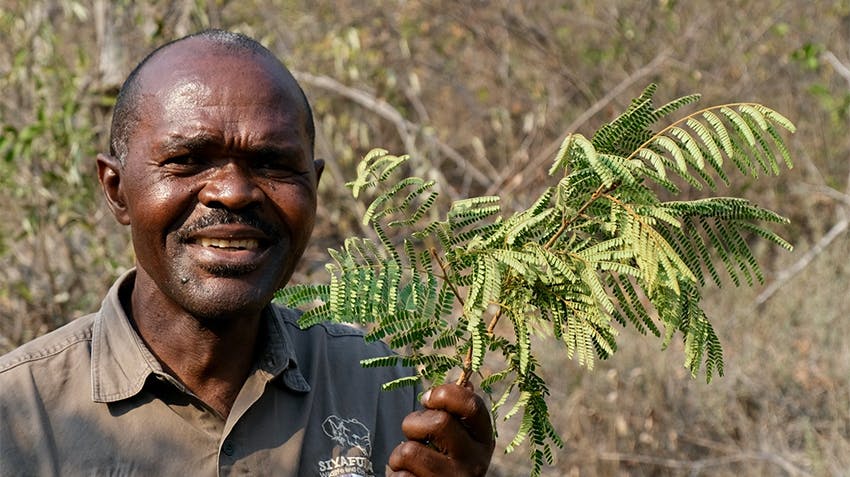
7. What are the most common misconceptions about these internships?
People often think they will see animals everywhere, all the time. While there is definitely the likelihood of seeing wildlife during these experiences, no sightings can ever be guaranteed. Wild animals will do what they like in the great outdoors, and sometimes this means not wanting to be seen by humans! (If you spend some time looking into the “behind the scenes” making of Planet Earth II, you will learn just how much time and patience goes into capturing wildlife footage!). However, this understanding can really heighten your awe and appreciation of the wildlife sightings that you do encounter. The longer you can spend, the more scope you have to see and experience a variety of diverse flora and fauna. It always depends on the luck of the day.
“This program was the most amazing trip I’ve ever taken. My stay in South Africa went way above my expectations. I received more value than I expected. The program was always very organized and we knew what was expected of us. I learned a lot about nature and wildlife. I think one of the most rewarding parts of my stay is how much I learned about the bush. One of the highlights of my stay was seeing the leopard Matemba and the local pride of lions. Meeting new people and making lifelong friends was also rewarding. The quality and quantity of food was very good. The camp was always in very good shape and clean. The advice I’d give to others who are considering this program is to stay as long as you can because it’s definitely worth it. I would also tell them to enjoy every minute of their stay here because it goes by so fast!.” - Ashlyn Henderson, Reserve Management & Research at Kruger National Park internship in South Africa
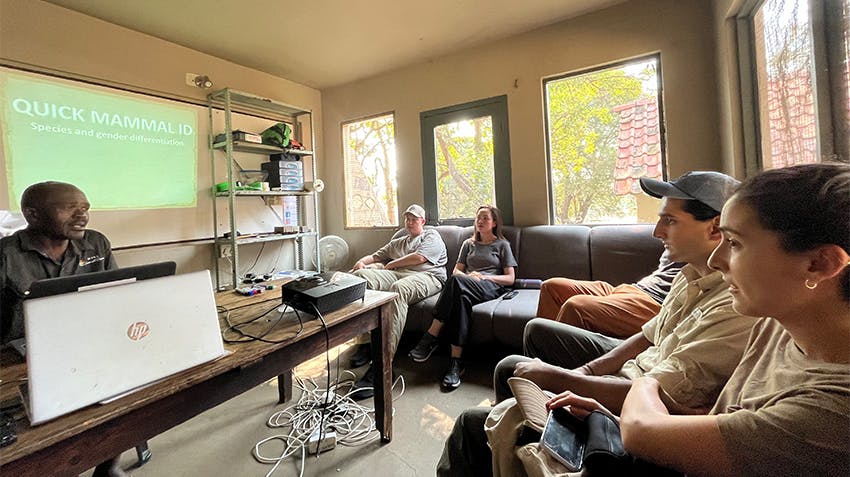
8. What are the safety considerations for an internship in South Africa?
As with traveling to any country or city in the world, there are guidelines to follow that will help to keep you healthy and safe. Not much is different in South Africa, we simply avoid some areas. The camps where interns are based during their placements are very secure and every participant is provided with a thorough safety briefing on any potential dangers and health hazards. All guides are very experienced in dealing with health and safety issues within the environments where we work and 24/7 support is provided, as local team members stay on-site in order to provide supervision and assistance at all times. We ask interns to take the safety briefings seriously and to always follow the instructions given by the camp guides.

9. How do interns access the South African Environmental Internships?
These details are great for you to keep in mind when researching and planning your. However, don’t book your flights until you have registered for your South Africa Environmental Internship first. This allows us to ensure that your place on the internship has been confirmed! Then we’ll provide more specific guidance for scheduling your travel.
Marine Biology & Reef Conservation Internships in Sodwana Bay - Arrival Airport: Richards Bay Airport (RCB)
You’re bound for the coast! After arriving in South Africa (usually flying into Johannesburg, which is the typical international gateway), interns must fly domestically into Richards Bay Airport (RCB). From there, interns are met and transferred to the camp, as one group.
Reserve Management & Research at Kruger National Park - Arrival Airport: Hoedspruit Airport (HDS)
There’s nothing like touching down in Hoedspruit and thinking, “this is Africa!” Experiencing the expanse of Kruger National Park is truly awe-inspiring. This kind of adventure definitely has the potential to become the trip of a lifetime. Interns wishing to join the program at Balule Game Reserve, Kruger National Park, would typically first fly into O.R. Tambo Airport in Johannesburg. This is the usual international gateway into South Africa. From there, a domestic connection to the Hoedspruit Airport (HDS) is required, where interns are met on arrival, and transferred to the camp as one group.
GIS & Reserve Management Internships in Gondwana Game Reserve - Arrival Airport: George Airport (GRJ)
Home of the Big Five game and an abundance of other wildlife, the Gondwana Game reserve is situated along the Garden Route in Western Cape. You may fly into an international gateway, such as Cape Town International Airport (CPT), but from here, you need to make your way to George Airport (GRJ). Interns will be met by the local team upon arrival and transported to the camp.
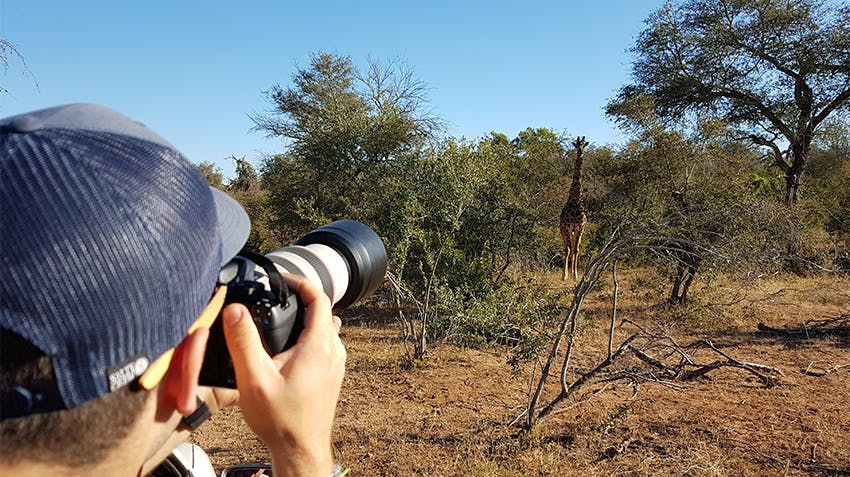
10. What can I expect from the meals and accommodation?
The bedrooms are shared dormitory-style for all of the South Africa Environmental internships. Accommodation upgrades are available (to single or double rooms with ensuite bathrooms) at the Kruger National Park only, at an additional cost, and this is subject to availability. There are no accommodation upgrades for Sodwana Bay or Gondwana Game Reserve.
Everyone must take turns preparing meals. (The food that’s provided for this purpose is supplied by the local staff and your internship program fee covers the cost of these groceries, so all meals during the stay are covered). It is no problem to cater for vegetarian or other dietary requirements and there is a weekly surcharge for this (just let us know in advance).
Learn more:
- Marine Biology & Reef Conservation Internships in Sodwana Bay
- Reserve Management & Research at Kruger National Park
- GIS & Reserve Management Internships in Gondwana Game Reserve
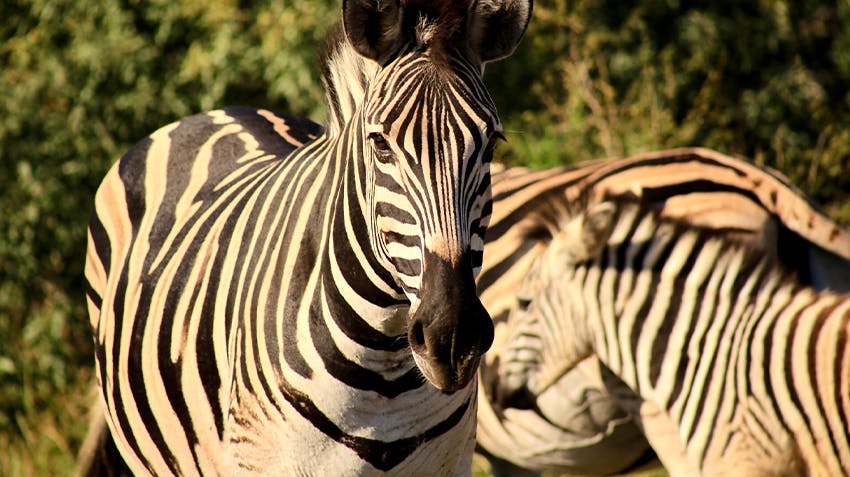
11. Is anyone eligible to join an environmental internship in South Africa?
Anybody is eligible to join the Environmental Internships in South Africa, whether you have a background in conservation or not. The experiences are entry-level and introductory but, for anyone who is studying in relevant areas (e.g. conservation wildlife, environmental sciences, biology, botany, etc) then - depending on whatever activities are being conducted at the time of your internship - you may be assigned to specific tasks that could be related to practical components of your studies. We always endeavor to assess interns in terms of their skills and interests and provide appropriate guidance and mentorship.
Although some of the internship activities can be physically demanding, the most important “entry requirements” for these internship placements are:
- The desire to step out of your comfort zone and learn something new
- The willingness to work hard and get your hands dirty
- Respect for conservation efforts and the environment
- A positive, friendly and helpful attitude
People with an appreciation for unique ecosystems are particularly encouraged to join these internship programs and gain interesting insight into diverse conservation challenges.
It can be a pretty big and scary step to travel to a different country. If you are ready to embrace a new culture and willing to immerse yourself here wholeheartedly, it will be one of the coolest and life-changing opportunities with the adventure of a lifetime!
The first step toward getting involved is to submit an application online. Applying for the program doesn’t commit you - but it allows us to formally receive your expression of interest, so that we can outline the process to confirm your participation and answer any questions.
“This internship was a life changing experience for me in many ways. I met some of the most amazing and authentic people in my life through this program. There was truly never a dull moment when surrounded by all the staff and interns. I grew my cultural awareness significantly during my time in this placement through interactions with locals and even simple, everyday experiences. I gained useful skills for my desired career field, such as species identification and proper scuba diving techniques, that will allow me to build a strong resume as I move forward with my career. With all of these aspects combined, my internship was an incredibly valuable experience that provided me with memories, skills, and a new outlook that will last me a lifetime.” - Riley Williams, Marine Biology & Reef Conservation internship in South Africa
12. Sign me up! How can I start planning my Environmental Internship?
Found your ideal opportunity? Don’t leave it to the last minute, start planning now! Submit your interest via our online application form (for free). We’ll review your application to confirm you’re a good match for your chosen internship program and that there is availability for the dates you’ve requested. We can then accept you into the program. Once you’re accepted, you can reserve your place - then let the adventure begin!
